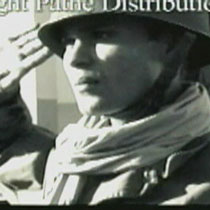2007年VOA标准英语-Human Rights Watch Opens 18th International Fil(在线收听)
New York
25 June 2007
The 18th annual Human Rights Watch International Film Festival, now underway in New York, is a collection of often harrowing films, both fictional and documentary. They run the gamut of subjects, from environmental destruction to voting rights, to genocide and sexual assault as a weapon in war.
 |
| Bruni Barres, the Human Right Watch film festival director, says judges look for films with wide relevance |
This year’s festival opened with a French/Belgian film, Mon Colonel, directed by Laurent Herbiet, and co-written by famed filmmaker Costa-Gavras. It’s a drama set against the brutal history of France's 1950s war with pro-independence Algerian insurgents.
 |
| Mon Colonel, a drama, is set against the history of the French war against Algerian insurgents |
The other opening night film also looked at government power. Lynn Hershman Leeson's Strange Culture uses cartoons, documentary footage, and dramatized re-creations to tell the not-yet-concluded saga of a Buffalo, New York political artist. When Steve Kurtz's wife died at home of a heart ailment in 2004, emergency workers saw scientific equipment that the Kurtzes had been using for an art exhibit about genetically-modified food. They called the FBI. Terrorism charges were not filed, but Steve Kurtz still faces 20 years in prison if convicted on federal fraud charges stemming from how he obtained the supplies.
 |
| Strange Culture examines the government's investigation of American political artist Steve Kurtz |
Carla's List, by Marcel Schupbach, is about the obstacles facing chief prosecutor Carla Del Ponte, head of the International Criminal Tribunal for the former Yugoslavia. Her work must be concluded by September of this year, but some of its main targets, including Radovan Karadzic and Ratko Mladic, have not been apprehended. The film suggests that is primarily because the Hague tribunal has no police power and depends on Serbia, Croatia and other members of the international community to make arrests.
Danish director Eva Mulvad's Enemies of Happiness tells the story of 28-year-old Afghan feminist Malalai Joya. She is a member of Afghanistan's parliament and has been the target of four separate assassination attempts. She became famous in 2003 when she spoke up in Afghanistan's constitutional assembly to condemn the power of those she termed warlords. Enemies of Happiness, whose director and cinematographer are both female, shows Joya's life both at home and in the public sphere over many months.
Enemies of Happiness won the Human Rights Watch film festival's annual Nestor Almendros prize for courage and commitment in human rights filmmaking. "To travel and film Malalai Joya for that amount of time in Afghanistan, deciding not to have any bodyguards, so they would have freedom to travel wherever she went, took incredible courage,” said festival director Bruni Barres.